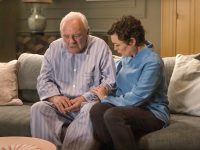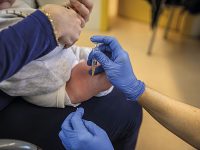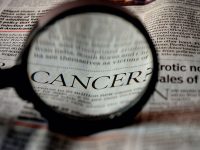
Image of the UK Biobank, with hundreds of DNA samples from different people, stored with the help of robotic devices. / Biobank UK
Being a professor at a public university, after studying at a public university and getting my PhD thanks to a public scholarship, makes me feel indebted to our entire society. Thanks to taxes, this society has helped me to obtain a degree that allows me to dedicate myself to work that I am passionate about: teaching and research.
How can I repay some of that debt? With honesty, by trying to carry out the tasks entrusted to me in a dignified manner. But I also believe that my gratitude has to go beyond teaching my students and trying to bring a bit of knowledge to the great building that is science. I believe that part of my contribution to society must be more immediate, that the knowledge I have acquired must be shared with the people around me, with those who need this knowledge and find it difficult to obtain it. That is why, whenever I can, I answer messages from those who ask me for knowledge: high school students doing research work or patients and families affected by hereditary genetic diseases. I try to reach out to areas that are outside the comfort zone, from primary schools to civic centres in small towns or neighbourhoods, from children to retired grandparents, to all those who want to know more about genetics and DNA.
Sometimes, surprisingly, I am asked the same questions. Last month I was contacted by people with different profiles to learn what I thought of online genetic testing. I must say that I am a researcher in human genetics and co-founder of a company that diagnoses hereditary vision disorders; therefore, I am a strong advocate of genetic testing when they have a clear objective: to improve the quality of life of patients and families. Complementing medical advice with specialised genetic diagnosis will become part of precision medicine in the future, an extremely important qualitative leap in health care.
«Most DNA banks are private, and their objectives do not necessarily coincide with ours»
But, alas, they are not asking about these genetic tests. They want to know about DNA tests that promise to reveal our ancestry, what physical characteristics we have, or if we have genetic variants that increase the risk of suffering from a number of ailments or of growing old prematurely. These tests are marketed globally by companies that are generally not located in our country and that follow very different legislation or regulations from those approved in European countries. These tests ask you to answer a series of questions about your habits, past ailments, or family characteristics. The test is very cheap and has a disclaimer that nobody reads, which indicates that your data can be used for other purposes different from your reason for sending the DNA sample, or that the data (anonymised, in theory) can be sold to third parties (pharmaceutical companies, insurance companies) or shared with the police (FBI). Well, my opinion is, at first glance, that I would not take them.
Several articles have been published about who is trying to get their hands on our DNA and why. It must also be noted that there are public and private DNA and genetic data banks. Some of the public biobanks (like the 100K in the UK, for example) have a public health and social welfare objective (the greater good), but most DNA banks are private, and their objectives do not necessarily coincide with ours. DNA is our most precious asset, and we are not its masters, but we have the right to use it, share it with our biological family and pass it on to our descendants. By giving away our DNA and genetic data, we are giving away the DNA and genetic data of our entire biological family. We have to think if the objective we are pursuing is worthwhile. If you are fully aware of this, then go ahead. Otherwise, think twice.
Who is making money from your DNA? (2019, BBC).
Kaiser, J. (2015) Who has your DNA –or wants it? Science 349:1475.
How to protect your DNA data before and after taking and at-home test (2019, The New York Times).





